裕兴新概念英语第二册笔记 第25课
裕兴新概念英语第二册笔记第二十五课
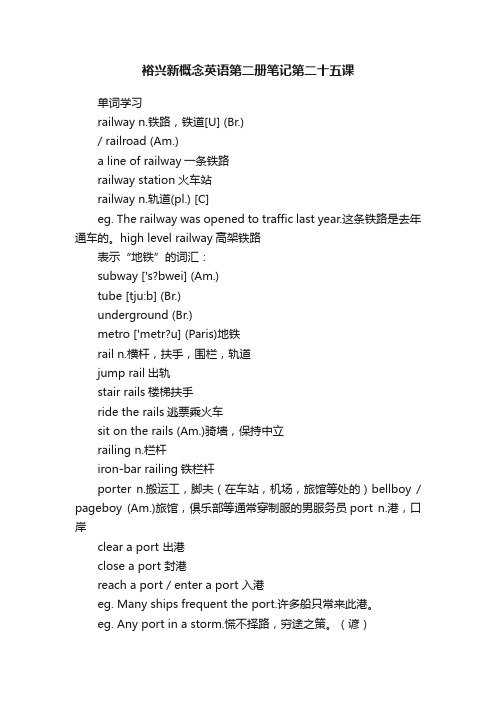
裕兴新概念英语第二册笔记第二十五课单词学习railway n.铁路,铁道[U] (Br.)/ railroad (Am.)a line of railway一条铁路railway station火车站railway n.轨道(pl.) [C]eg. The railway was opened to traffic last year.这条铁路是去年通车的。
high level railway高架铁路表示“地铁”的词汇:subway ['s?bwei] (Am.)tube [tju:b] (Br.)underground (Br.)metro ['metr?u] (Paris)地铁rail n.横杆,扶手,围栏,轨道jump rail出轨stair rails楼梯扶手ride the rails逃票乘火车sit on the rails (Am.)骑墙,保持中立railing n.栏杆iron-bar railing铁栏杆porter n.搬运工,脚夫(在车站,机场,旅馆等处的)bellboy / pageboy (Am.)旅馆,俱乐部等通常穿制服的男服务员port n.港,口岸clear a port 出港close a port 封港reach a port / enter a port 入港eg. Many ships frequent the port.许多船只常来此港。
eg. Any port in a storm.慌不择路,穷途之策。
(谚)1) more than three but fewer than many 一些,几个eg. Several more people than usual came to the concert.来音乐会的人比平常多了几个。
eg. I repeated my questions several times.我把问题重复了几遍。
2)各自的,各个的(文)eg. Several men, several minds.人各有志;10个人有10个样。
新概念第二册Lesson25重要词组及语法讲解

新概念第二册Lesson25重要词组及语法讲解wonder* 感到惊讶,感到诧异They wondered that there was a modern building in that district.They wondered at the beauty of the old town.*(对…)感到疑惑/怀疑,想知道I wonder what will happen next.Will he come to dinner? I wonder.* n. 奇迹,奇观,器材;惊奇,惊讶Jane is a wonder. She never fails in her examination.She looked at the boss in wonder.He is curious about the seven wonders of the world in ancient times。
No wonder. 怪不得。
1.我很好奇。
I wonder.2.我为他的粗鲁吃惊。
I wonder at his rudeness.3.我想知道他是谁。
I wonder who he is.4.我想知道他是怎么做的。
I wonder how he did it.5.我想知道她什么时候能来。
I wonder when she will come.6.我想知道为什么博物馆今天关门了。
I wonder why the museum is closed today7.我在想你会不会帮我。
I’m wondering if you could help me.8.这是个巨大的奇迹。
It’s a great wonder.the+ adj. 表示一类人* the+adj. 若表示一类具有某种特征或特性的人时,通常表示复数意义,若用作主语,谓语要用复数。
The rich get richer and the poor get poorer.The injured were carried away on stretchers.The old are more likely to catch cold than the young.* the+adj. 若表示抽象概念,则表示单数意义,用作主语时,谓语要用单数。
裕兴新概念英语第二册笔记 第25课学习资料

裕兴新概念英语第二册笔记第25课Lesson 25 Do the English speak English? 英国人讲的是英语吗?Why does the writer not understand the porter?I arrived in London at last. The railway station was big, black and dark. I did not know the way to my hotel, so I asked a porter. I not only spoke English very carefully, but very clearly as well. The porter, however, could not understand me. I repeated my question several times and at last he understood. he answered me, but he spoke neither slowly nor clearly. 'I am a foreigner,' I said. Then he spoke slowly, but I could not understand him. My teacher never spoke English like that! The porter and I looked at each other and smiled. Then he said something and I understood it.'You'll soon learn English!' he said. I wonder. In England, each person speaks a different language. The English understand each other, but I don't understand them! Do they speak English?参考译文我终于到了伦敦。
新概念英语 第二册 lesson25-38笔记

lesson25笔记1.railway station 火车站2.several adj. 几个+ pl.3.wonder at = be surprised at 对。
感到吃惊4.work wonders 创造奇迹5.at last= in the end = finally 最终;最后6.the answer to the question 问题的答案7.the key to the door 门上的钥匙8.not only....but also= not only....but ...as well=not only... but....too不但。
而且(连接两个主语时,动词形式采取就近原则)eg:Not only I but also Lucy is a student.不但露西是学生,而且我也是学生。
9.neither ... nor ....既不。
也不(连接两个主语时,动词形式采取就近原则)eg:Neither Lucy nor I am a student.既不是露西是学生,也不是我是学生。
10.冠词小语法:the+ 特殊形容词表示一类人(1)the + 国籍形容词the + English 英国人(2) the + 老弱病残the old/ blind/young/rich/ poor/deaf老人/ 盲人/年轻人/富人/穷人/聋哑人lesson25生词1.railway/ˈreɪlweɪ/ n. 铁路2.platform /ˈplætfɔːm/ n.站台3.timetable列车时间表4. rail /reɪl/ n. 扶手;栏杆;铁轨5.porter /ˈpɔːtə(r)/ n. 搬运工6.port/pɔːt/ n. 港口7.seaport 海港8.import /ˈɪmpɔːt/n. / v.进口9.export /ɪkˈspɔːt/v./n. 出口10.several /ˈsevrəl/ adj. 几个11.cookie /ˈkʊki/ n.饼干;小点心12.biscuit /ˈbɪskɪt/ n.饼干;小点心13.foreigner/ˈfɒrənə(r)/ n. 外国人14.foreign/ˈfɒrən/ adj. 外国的15.wonder /ˈwʌndə(r)/ v.想知道;吃惊n. 奇迹16. repeat /rɪˈpiːt/ v. 重复生词1.wizard [ˈwɪzəd] n. 男巫2.magical [ˈmædʒɪkl] adj. 有魔力的3.hunger [ˈhʌŋɡər] n.饥饿4.continue [kənˈtɪnjuː] v. 继续5.weak [wiːk] adj. 虚弱的6.feed [fiːd] v. 喂养;进食7.farmland [ˈfɑːmlænd] n. 农田8.step [step] n. 脚步;步骤;梯级vi. 踩9.fit [fɪt] v. 适合adj. 健康的10.brain [breɪn] n. 大脑11.require [rɪˈkwaɪə] vt. 要求12.strengthen [ˈstreŋθn] v. 加强;巩固13.memory [ˈmeməri] n. 记忆;回忆14.aim [eɪm] n. 目的;瞄准15.wake [weɪk] v. 醒来;唤醒;16.source [sɔːs] n. 来源17.berry /ˈberi/ n. 浆果类18.spinach [ˈspɪnɪtʃ] n. 菠菜19.figure [ˈfɪɡjər] n. 数字20.challenge /ˈtʃælɪndʒ/ n. 挑战21.benefit [ˈbenɪfɪt] n. 利益v.受益;22.master [ˈmæstər] n. 主人;大师;v. 掌握23.sudoku [suˈdoʊkuː] n. 数独,九宫格游戏24.mental [ˈmentl] adj. 脑力的25.effective [ɪˈfektɪv] adj. 有效的,26.perform [pərˈfɔːrm] v. 执行;演奏27.level [ˈlevl] n.水平28.skill [skɪl] n. 技能29.social [ˈsoʊʃl] adj. 社会的,社交的30.media [ˈmiːdiə] n. 媒体31.download /daʊn'ləʊd/ vt. 下载32.check [tʃek] vt. 检查33.update [ˌʌpˈdeɪt] vt. 更新34.distance [ˈdɪstəns] n. 距离vt. 疏远35.influence [ˈɪnfluəns] n. & v. 影响36.normal [ˈnɔːrml] adj. 正常的37.blog [blɑːɡ] n. 博客38.balance [ˈbæləns] n./ v. 平衡39.interest [ˈɪntrest] n. 兴趣;利益;vt. 使……感兴趣;40.personal [ˈpɜːrsənl] adj. 个人的41.function [ˈfʌŋkʃn] n. 功能;42.connect [kəˈnekt] v. 连接;联合43.warn [wɔːrn] v. 警告,提醒44.risk [rɪsk] n. 危险45.post [poʊst] v.张贴munity [kəˈmjuːnəti] n. 社区47.consider [kənˈsɪdər] v. 考虑;认为;48.instead of 代替;而不是49.social media 社会媒体50.in addition 另外51.figure out 解决;算出;弄清楚52.wake up 醒来;叫醒53.once upon a time 从前54.be short of 缺乏……55.be dying of 死于。
新概念二-新概念英语第二册第25课-Do the English speak English-
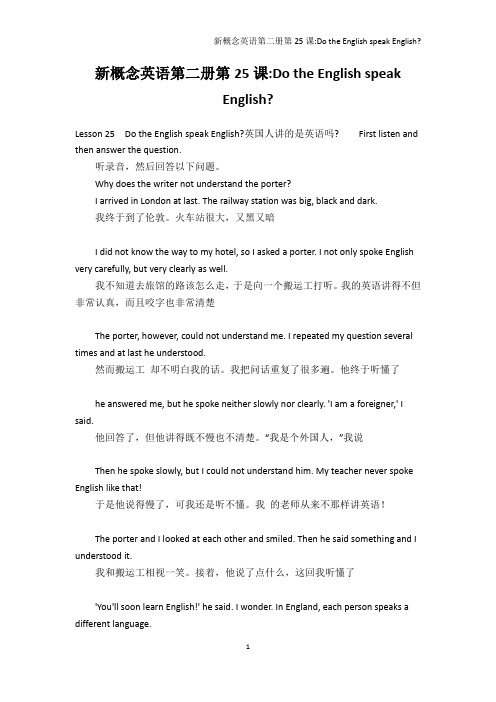
新概念英语第二册第25课:Do the English speakEnglish?Lesson 25 Do the English speak English?英国人讲的是英语吗?First listen and then answer the question.听录音,然后回答以下问题。
Why does the writer not understand the porter?I arrived in London at last. The railway station was big, black and dark.我终于到了伦敦。
火车站很大,又黑又暗I did not know the way to my hotel, so I asked a porter. I not only spoke English very carefully, but very clearly as well.我不知道去旅馆的路该怎么走,于是向一个搬运工打听。
我的英语讲得不但非常认真,而且咬字也非常清楚The porter, however, could not understand me. I repeated my question several times and at last he understood.然而搬运工却不明白我的话。
我把问话重复了很多遍。
他终于听懂了he answered me, but he spoke neither slowly nor clearly. 'I am a foreigner,' I said.他回答了,但他讲得既不慢也不清楚。
“我是个外国人,”我说Then he spoke slowly, but I could not understand him. My teacher never spoke English like that!于是他说得慢了,可我还是听不懂。
《新概念英语》第二册学习笔记26 25课

《新概念英语》第二册学习笔记26 25课第26课The best art critics1、I am an art student.art student 学艺术的学生fine arts 美术2、They always tell you what a picture is 'about'.此句实际就是说:They always tell you what a picture means. 注意about的用法3、We like them in the same way that we like pretty curtain material.them 指代前面说patternsin the same way that 以同样的方式4、I think that young children often appreciate modern pictures better than anyone else.appreciate 此句中意思是欣赏anyone else 指除了young children 以外的任何人5、I'm hanging this picture on the wall. It's a new one.one 指代picture, picture 是指笼统意义上的picture6、But isn't it upside down?反问句,反问句的构成就是把助动词的否定形式提前7、She was right! It was!It was = It was upside down.8、She always tells me whether my pictures are good or not.whether 引导的宾语从句,语序按陈述句,whether 后面也可以跟不定式短语whether ......or not 是否,有时or not 可以省略。
新概念第二册Lesson25(第25课)
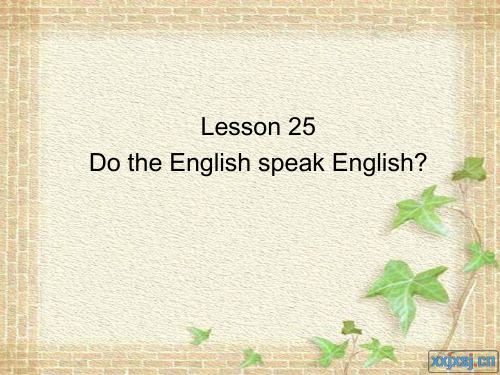
4.wonder
• • • • • • • n.奇观 世界七大奇观:the seven great wonders in the world What a wonder!多么奇妙 It’s a wonder that he survived the plane crash. 短语:No/little wonder No wonder that ……=It’s no wonder that…… e.g.She’s jumping the rail.No wonder her husband dumped her.
3.I did not know the way to my hotel, so I asked a porter. • the way to:to 是介词,介词短语充当the way的定语,类似的如: • 房门的钥匙:the key to the door • 问题的答案:the answer to the question • 大楼的入口:the entrance to the building • 都表示一种由此及彼的方向。
Lesson 25 Do the English speak English?
1. railway
• n.铁路(BrE) = railroad(AmE) • 表示道路的单词: highway,freeway,expressway,motorway • highway:公路 • motorway(BrE) = freeway(AmE) :高速公路(主要指城市与 城市之间的) • express:除了v.表达以外,还可以用作adj,表示快速的、特 快的 • e.g. express service:快递服务 • EMS • express mail service • expressway快速通道(主要指城市内的,例如高架桥)
新概念英语第二册第25课-Do the English speak English-

新概念英语第二册第25课:Do the English speakEnglish?Lesson 25 Do the English speak English?英国人讲的是英语吗?First listen and then answer the question.听录音,然后回答以下问题。
Why does the writer not understand the porter?I arrived in London at last. The railway station was big, black and dark.我终于到了伦敦。
火车站很大,又黑又暗I did not know the way to my hotel, so I asked a porter. I not only spoke English very carefully, but very clearly as well.我不知道去旅馆的路该怎么走,于是向一个搬运工打听。
我的英语讲得不但非常认真,而且咬字也非常清楚The porter, however, could not understand me. I repeated my question several times and at last he understood.然而搬运工却不明白我的话。
我把问话重复了很多遍。
他终于听懂了he answered me, but he spoke neither slowly nor clearly. 'I am a foreigner,' I said.他回答了,但他讲得既不慢也不清楚。
“我是个外国人,”我说Then he spoke slowly, but I could not understand him. My teacher never spoke English like that!于是他说得慢了,可我还是听不懂。
裕兴新概念英语笔记:Lesson 25 Mrs. Smith's Kitchen

Lesson 25 Mrs. Smith's Kitchen语音音节和词重音单音节词,如good, bad, die, live等。
双音节词,如china, better, running, pretty等。
多音节词,如October, beautiful, scientific等。
在双音节和多音节词中,其中一个音节读得重,称为重读音节;其它读得轻,称为非重读音节。
在多音节词还有主重音和次重音之分。
主重音用[´]符号,次重音用[.]符号。
如:preposition [.prepəˈziʃən]examination [iɡ.zæmiˈneiʃən]New words and expressions:Mrs.夫人kitchen n.厨房refrigerator n. 电冰箱right n.右边electric adj. 带电的,可通电的left n.左边cooker n. 炉子,炊具middle n.中间of prep.(属于)……的room n.房间cup n.杯子Mrs.夫人Mrs. Smith 史密斯太太(表示她的丈夫姓Smith) Miss 小姐(指未婚)Miss Lee 李小姐Ms. 女士(已婚与未婚都可以用)Ms. Dupont 杜邦女士kitchen n.厨房refrigerator n.电冰箱--- Are there any eggs in the refrigerator?在电冰箱里有一些鸡蛋吗?--- No, there aren't. 没有。
right n. 右边on the right 在右边That's all right.= It doesn't matter.没关系。
--- I'm sorry.--- That's all right. (It doesn't matter.)Are you all right?=Are you OK?你们还好吗?That’s right.没错,对。
新概念英语笔记(第二册,25-48课)

Nce2-25:Do the English speak English?1、Do the English speak English?1)English:(1)第一个English:英国人(总称,其前加the,其后的动词必须用复数);第二个English:英语。
指人时,前面加the,指语言时,前面不加the。
例:The English often talk about the weather. 英国人经常谈论天气。
Do you speak English? 你会说英语吗?(2)English:adj 英格兰的、英国的、英国人的(3)与English类似的单词有:French、Chinese、Japanese2、I arrived in London at last.1)At last =In the end:终于,一般暗指经过一番等待、麻烦(苦恼)或努力之后例:It is my turn at last. 终于轮到我了。
At least:至少;Lastely:最近的一段时间、最新的2)Arrive:vi 到达Arrive in +大地方:到达……(地点);例:I arrived in London.Arrive at +小地方:到达……(地点);例:I arrived at that station.Reach +宾语:到达(Reach后面必须加宾语)Get to +宾语:到达Get home:到家;Get there:到那里例:When will you get to Beijing(arrive in Beijing;reach Beijing)?注:Get home:到家;Get there:到那里(Home和there是副词,副词和动词连用时,前面不用加介词,arrive和get也一样,一般不用reach home / there,如果用reach home / there,则home是名词,there是代词)3、The railway station was big, black and dark. 火车站又大又黑又暗。
新概念第二册第二单元第25-48课知识点总结

Lesson 31 Success story
retire, company, bicycle, save, workshop, helper, employ, grandson
used to do的用法
Lesson 32 Shopping mode easy
Lesson 34 Quick work
station, most
被动语态(参考第10课)
Lesson 35 Stop thief!
while, regret, far, rush, act, straight, fright, battered, shortly, afterwards
复习第26-34课的关键句型
Lesson 36 Across the channel!
record, strong, swimmer, succeed, train, anxiously, intend, solid
一般将来时:be going to与will(参考第一册第37-40课以及第91-96课)
Lesson 37 The Olympic Games
动名词的用法(参考第20课)
Lesson 45 A clear conscience
clear, conscience, wallet, savings, villager, percent
复习第10、21、34课关键句型:被动语态
Lesson 46 Expensive and uncomfortable
thirsty,ghost, haunt, block, furniture, whisky, suggest, shake, accept
新概念英语第二册-Lesson25知识讲解PPT共67页

谢谢!
36、自己的鞋我们唯一不会改正的缺点是软弱。——拉罗什福科
xiexie! 38、我这个人走得很慢,但是我从不后退。——亚伯拉罕·林肯
39、勿问成功的秘诀为何,且尽全力做你应该做的事吧。——美华纳
40、学而不思则罔,思而不学则殆。——孔子
新概念英语第二册-Lesson25知识讲解
11、获得的成功越大,就越令人高兴 。野心 是使人 勤奋的 原因, 节制使 人枯萎 。 12、不问收获,只问耕耘。如同种树 ,先有 根茎, 再有枝 叶,尔 后花实 ,好好 劳动, 不要想 太多, 那样只 会使人 胆孝懒 惰,因 为不实 践,甚 至不接 触社会 ,难道 你是野 人。(名 言网) 13、不怕,不悔(虽然只有四个字,但 常看常 新。 14、我在心里默默地为每一个人祝福 。我爱 自己, 我用清 洁与节 制来珍 惜我的 身体, 我用智 慧和知 识充实 我的头 脑。 15、这世上的一切都借希望而完成。 农夫不 会播下 一粒玉 米,如 果他不 曾希望 它长成 种籽; 单身汉 不会娶 妻,如 果他不 曾希望 有小孩 ;商人 或手艺 人不会 工作, 如果他 不曾希 望因此 而有收 益。-- 马钉路 德。
新概念英语第二册逐句精讲语言点第25课
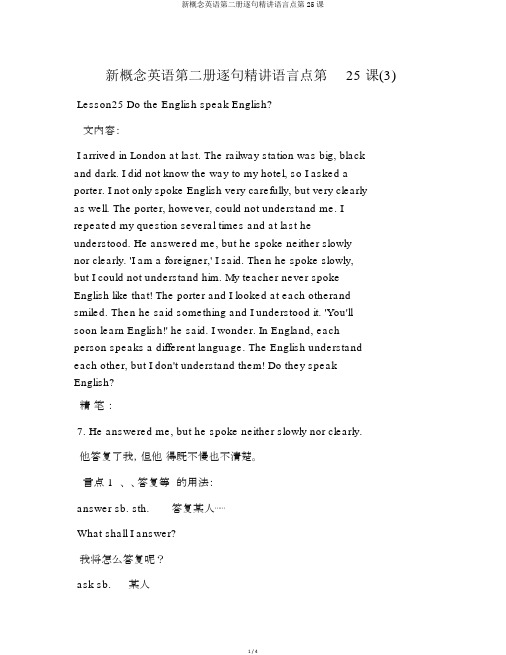
新概念英语第二册逐句精讲语言点第25 课(3) Lesson25 Do the English speak English?文内容:I arrived in London at last. The railway station was big, blackand dark. I did not know the way to my hotel, so I asked aporter. I not only spoke English very carefully, but very clearlyas well. The porter, however, could not understand me. Irepeated my question several times and at last heunderstood. He answered me, but he spoke neither slowlynor clearly. 'I am a foreigner,' I said. Then he spoke slowly,but I could not understand him. My teacher never spokeEnglish like that! The porter and I looked at each otherand smiled. Then he said something and I understood it. 'You'llsoon learn English!' he said. I wonder. In England, eachperson speaks a different language. The English understandeach other, but I don't understand them! Do they speakEnglish?精笔:7. He answered me, but he spoke neither slowly nor clearly.他答复了我,但他得既不慢也不清楚。
新概念英语第2册Lesson25~27课文详注

新概念英语第2册Lesson25~27课文详注新概念英语第2册Lesson25课文详注1.Do the English speak English? (标题)英国人讲的是英语吗? English在这里均为名词,但意义不同。
第1个指“英国人”,为总称,后面的动词必需用复数;第2个指“英语”。
指语言时前面不加冠词,指人则要加the:The English often talk about the weather.英国人常常谈论天气。
Do you speak English?你会讲英语吗?English还可以作形容词,表示“英格兰的”、“英国的”、“英国人的”等:He was English.他是个英国人。
与English相像的单词有French,Chinese,Japanese等:I said good morning to him in French.我用法语向他问早上好。
2.I arrived in London at last. 我最终到了伦敦。
(1)这里London前面不加冠词,介词in暗指London是个大地方。
(2)at last为固定短语,表示“最终”,一般暗指经过一番等待、麻烦(苦恼)或努力之后:It was my turn at last.最终轮到我了。
I repeated my question several times and at last he understood.我把问话重复了许多遍。
他最终听懂了。
3.I did not know the way to my hotel…我不知道去饭店的路该怎么走……my hotel不是指属于我的饭店(或旅馆),而是指我已订了房间或者要去住的饭店。
4.I not only spoke English very carefully, but very clearly as well.我的英语讲得不但特别仔细,而且咬字也特别清晰。
not only…but…as well这组连接词与 not only…but also是同样的意思,都表示“不但……而且……”,not only与 but后面的成分必需对等。
(完整版)裕兴新概念英语第二册笔记第25课
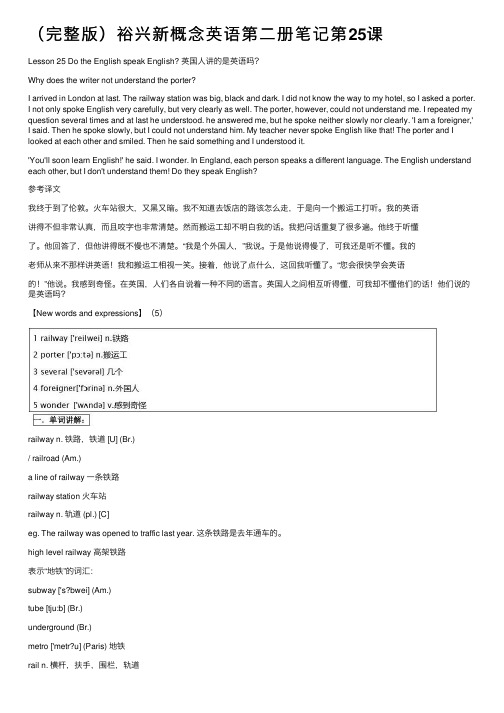
(完整版)裕兴新概念英语第⼆册笔记第25课Lesson 25 Do the English speak English? 英国⼈讲的是英语吗?Why does the writer not understand the porter?I arrived in London at last. The railway station was big, black and dark. I did not know the way to my hotel, so I asked a porter.I not only spoke English very carefully, but very clearly as well. The porter, however, could not understand me. I repeated my question several times and at last he understood. he answered me, but he spoke neither slowly nor clearly. 'I am a foreigner,' I said. Then he spoke slowly, but I could not understand him. My teacher never spoke English like that! The porter and I looked at each other and smiled. Then he said something and I understood it.'You'll soon learn English!' he said. I wonder. In England, each person speaks a different language. The English understand each other, but I don't understand them! Do they speak English?参考译⽂我终于到了伦敦。
新概念英语第二册课堂笔记:第25课
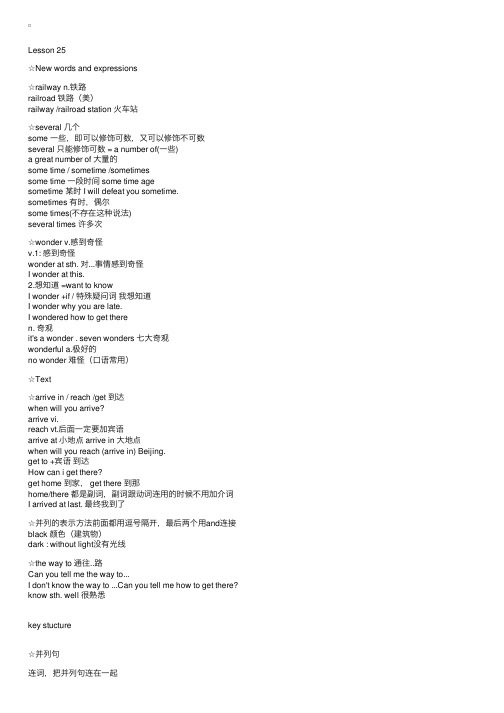
Lesson 25☆New words and expressions☆railway n.铁路railroad 铁路(美)railway /railroad station ⽕车站☆several ⼏个some ⼀些,即可以修饰可数,⼜可以修饰不可数several 只能修饰可数 = a number of(⼀些)a great number of ⼤量的some time / sometime /sometimessome time ⼀段时间 some time agesometime 某时 I will defeat you sometime.sometimes 有时,偶尔some times(不存在这种说法)several times 许多次☆wonder v.感到奇怪v.1: 感到奇怪wonder at sth. 对...事情感到奇怪I wonder at this.2.想知道 =want to knowI wonder +if / 特殊疑问词我想知道I wonder why you are late.I wondered how to get theren. 奇观it's a wonder . seven wonders 七⼤奇观wonderful a.极好的no wonder 难怪(⼝语常⽤)☆Text☆arrive in / reach /get 到达when will you arrive?arrive vi.reach vt.后⾯⼀定要加宾语arrive at ⼩地点 arrive in ⼤地点when will you reach (arrive in) Beijing.get to +宾语到达How can i get there?get home 到家, get there 到那home/there 都是副词,副词跟动词连⽤的时候不⽤加介词I arrived at last. 最终我到了☆并列的表⽰⽅法前⾯都⽤逗号隔开,最后两个⽤and连接black 颜⾊(建筑物)dark : without light没有光线☆the way to 通往..路Can you tell me the way to...I don't know the way to ...Can you tell me how to get there? know sth. well 很熟悉key stucture☆并列句连词,把并列句连在⼀起and 和but 但是so 因此yet adv.然⽽ have you finished yet?yet = but 放在两个句⼦中间,起转折作⽤or 或者,否则hurry up, you will be late./hurry up, or you will be late. both...and... 不但...⽽且either...or... 或者...或者,要么...要么either you or Ineither ...nor... 既不...也不not only ...but...as well 不但...⽽且...not only ...but also.. 不但...⽽且...。
裕兴新概念英语第二册笔记 第25课

Lesson 25 Do the English speak English? 英国人讲的是英语吗?Why does the writer not understand the porter?I arrived in London at last. The railway station was big, black and dark. I did not know the way to my hotel, so I asked a porter. I not only spoke English very carefully, but very clearly as well. The porter, however, could not understand me. I repeated my question several times and at last he understood. he answered me, but he spoke neither slowly nor clearly. 'I am a foreigner,' I said. Then he spoke slowly, but I could not understand him. My teacher never spoke English like that! The porter and I looked at each other and smiled. Then he said something and I understood it.'You'll soon learn English!' he said. I wonder. In England, each person speaks a different language. The English understand each other, but I don't understand them! Do they speak English?参考译文我终于到了伦敦。
新概念英语第二册第25课-Do the English speak English-

新概念英语第二册第25课:Do the English speak English?Lesson 25 Do the English speak English?英国人讲的是英语吗?First listen and then answer the question.听录音,然后回答以下问题。
Why does the writer not understand the porter?I arrived in London at last. The railway station was big, black and dark.我终于到了伦敦。
火车站很大,又黑又暗I did not know the way to my hotel, so I asked a porter. I not only spoke English very carefully, but very clearly as well.我不知道去旅馆的路该怎么走,于是向一个搬运工打听。
我的英语讲得不但非常认真,而且咬字也非常清楚The porter, however, could not understand me. I repeated my question several times and at last he understood.然而搬运工却不明白我的话。
我把问话重复了很多遍。
他终于听懂了he answered me, but he spoke neither slowly nor clearly. I am a foreigner, I said.他回答了,但他讲得既不慢也不清楚。
“我是个外国人,”我说Then he spoke slowly, but I could not understand him. My teacher never spoke English like that!于是他说得慢了,可我还是听不懂。
- 1、下载文档前请自行甄别文档内容的完整性,平台不提供额外的编辑、内容补充、找答案等附加服务。
- 2、"仅部分预览"的文档,不可在线预览部分如存在完整性等问题,可反馈申请退款(可完整预览的文档不适用该条件!)。
- 3、如文档侵犯您的权益,请联系客服反馈,我们会尽快为您处理(人工客服工作时间:9:00-18:30)。
Lesson 25 Do the English speak English? 英国人讲的是英语吗?Why does the writer not understand the porter?I arrived in London at last. The railway station was big, black and dark. I did not know the way to my hotel, so I asked a porter. I not only spoke English very carefully, but very clearly as well. The porter, however, could not understand me. I repeated my question several times and at last he understood. he answered me, but he spoke neither slowly nor clearly. 'I am a foreigner,' I said. Then he spoke slowly, but I could not understand him. My teacher never spoke English like that! The porter and I looked at each other and smiled. Then he said something and I understood it.'You'll soon learn English!' he said. I wonder. In England, each person speaks a different language. The English understand each other, but I don't understand them! Do they speak English?参考译文我终于到了伦敦。
火车站很大,又黑又暗。
我不知道去饭店的路该怎么走,于是向一个搬运工打听。
我的英语讲得不但非常认真,而且咬字也非常清楚。
然而搬运工却不明白我的话。
我把问话重复了很多遍。
他终于听懂了。
他回答了,但他讲得既不慢也不清楚。
“我是个外国人,”我说。
于是他说得慢了,可我还是听不懂。
我的老师从来不那样讲英语!我和搬运工相视一笑。
接着,他说了点什么,这回我听懂了。
“您会很快学会英语的!”他说。
我感到奇怪。
在英国,人们各自说着一种不同的语言。
英国人之间相互听得懂,可我却不懂他们的话!他们说的是英语吗?【New words and expressions】(5)railway n. 铁路,铁道 [U] (Br.)/ railroad (Am.)a line of railway 一条铁路railway station 火车站railway n. 轨道 (pl.) [C]eg. The railway was opened to traffic last year. 这条铁路是去年通车的。
high level railway 高架铁路表示“地铁”的词汇:subway ['sʌbwei] (Am.)tube [tju:b] (Br.)underground (Br.)metro ['metrəu] (Paris) 地铁rail n. 横杆,扶手,围栏,轨道jump rail 出轨stair rails 楼梯扶手ride the rails 逃票乘火车sit on the rails (Am.) 骑墙,保持中立railing n. 栏杆iron-bar railing 铁栏杆porter n. 搬运工,脚夫(在车站,机场,旅馆等处的)bellboy / pageboy (Am.) 旅馆,俱乐部等通常穿制服的男服务员port n. 港,口岸clear a port 出港close a port 封港reach a port / enter a port 入港eg. Many ships frequent the port. 许多船只常来此港。
eg. Any port in a storm. 慌不择路,穷途之策。
(谚)several1) more than three but fewer than many 一些,几个eg. Several more people than usual came to the concert.来音乐会的人比平常多了几个。
eg. I repeated my questions several times. 我把问题重复了几遍。
2) 各自的,各个的(文)eg. Several men, several minds. 人各有志;10个人有10个样。
(谚)foreigner n. 外国人a blue-eyed foreigner 一个蓝眼睛的外国人entertain foreigners 款待外宾 entertain [,entə'tein] vt. & vi.款待, 招待foreign ['fɔrin] adj. 外国的,无关的,陌生的foreign languageforeign goods 外国货foreign students 留学生foreign affairs 外交事务foreign policy 外交政策foreign trade 外贸eg. The question is foreign to the matter in hand. 这问题与处理中的事情无关。
eg. The subject is foreign to us. 我们对这个问题很陌生。
overseas / oversea adj. 在海外的,来自海外的,侨居海外的overseas trade 海外贸易adv. 在海外,来自海外go overseas 到海外去,adj. + er →n.strange →strangerforeign →foreignerwonder n./v.1) n. 奇迹the seven wonders of the world 世界七大奇迹eg. What a wonder. 真奇妙!eg. It is a wonder that he survived the plane crash. 他在空难中幸存下来,真是个奇迹。
and no wonder / and little wonder (用来强调前面的句子)不足为奇,难怪eg. He declined our offer, and no wonder. 难怪他拒绝了我们的给予。
decline [di'klain] vt. & vi.辞谢; 谢绝(邀请等)a nine-day wonder 一时的轰动No wonder that… / It is no wonder that… 难怪…eg. No wonder you were late! 难怪你来晚了。
2) v. 感到惊奇、惊讶wonder at sth 对某事感到惊奇eg. We wonder at the speed of modern trains. 我们对现代火车的速度感到惊奇。
接宾语从句:eg. I wonder that you weren’t killed. 真奇怪,你居然没有被杀死。
3. v. 对某事感到好奇,想知道 ask oneself questionseg. I wonder who he is. 我真想知道他是谁。
eg. I wonder whether you can lend me £20. 我想知道你是否能借给我20英镑。
wonderful adj. 令人惊奇的,绝妙的,神奇的(口)eg. She is a wonderful mother. 她是位伟大的母亲。
eg. She is a wonderful wife. 她是位极出色的妻子。
eg. The weather is wonderful. 天气棒极了。
eg. The teacher is wonderful. 这位老师非常好。
eg. The enthusiasm to study English is wonderful. 这种学习英语的热情是极棒的。
enthusiasm [in'θju:ziæzəm] n.热情, 热心;巨大兴趣, 热衷的事物并列句如果句子包含有两个或更多互不依从的主谓结构,就是并列句。
并列句中的分句通常用连词来连接,常用的连词有:and, but, so ,yet, or, both...and, either…or, neither…nor, not only...but also, not only...but...as welland 前后是顺承关系but 前后是转折关系so因果关系yet转折关系or表示否则的意思both...and 不但...而且...either...or 或者A或者Bneither...nor 既不...也不...not only...but also 不但...而且...not only...but...as well 不但...而且...1) The camera-work is perfect and the cast is good.电影拍摄非常棒而且演员也非常出色。
2) Honey is sweet, but the bee stings. (谚)玫瑰虽香但刺却扎人。
sting v. 蛰,刺3) Xiao Wang is coming here tomorrow, too, so you might as well come with her.小王明天也来,所以你来时跟她一块来吧。
4) We must redouble our efforts, or we'll never be able to catch up with the others.我们必须加倍努力,否则我们永远不可能追上别人。
5) Both he and工teach English.他和我都教英语He teaches both English and French. 。
他既教英语又教法语。
6) Either you or I must tell him.He plays either soccer or rugby.或者是你或者是我必须告诉他。
他踢英式足球或者是橄榄球。
(前半句连接并列的主语,后半句连接并列的宾语。
